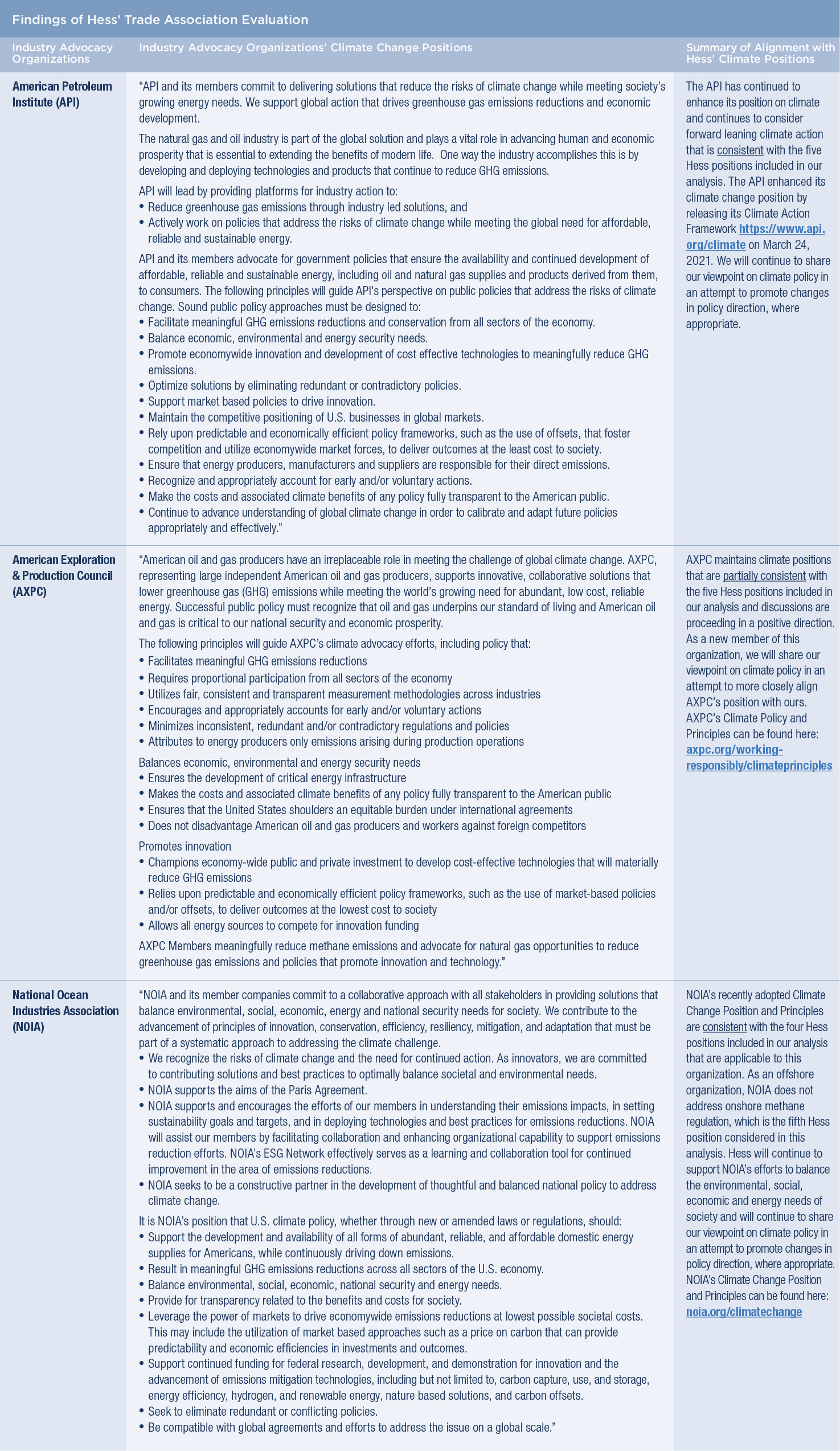Hess is a member of many associations, organizations and collaborative working groups. While many of these associations, organizations and collaborative working groups share Hess’ positions on climate change, our positions do not always align with all formal positions of these groups, and our membership should not be considered a direct endorsement of the entire range of activities that they undertake. However, these organizations often provide broader value to our company in the form of industry environmental, health and safety standards, along with opportunities to promote ongoing emissions reductions and transparency through industry led voluntary programs. Additionally, decisions by Hess to become a member or to discontinue a particular membership or relationship with an organization are made based on a variety of factors and should not be solely attributed to alignment or misalignment on any one issue.
In 2021, we actively participated in ongoing efforts to update association positions, including on climate change and methane emissions, so that they more closely align with our positions. To address concerns related to potential inconsistency on a variety of issues, we publish our own positions on key sustainability topics in this annual report.
To illustrate our alignment on climate change policies with our national and international memberships and associations, we evaluate major advocacy organizations that have historically received more than $50,000 from Hess in any given year. For our most recent analysis completed earlier this year, we did not include the Independent Petroleum Association of America or U.S Chamber of Commerce, as we did not renew these memberships for 2022. Similarly, we have joined the American Exploration & Production Council (AXPC) in 2022 and have thus included it in this most recent analysis.
Furthermore, although we are an active member of IPIECA on sustainable development issues such as climate change, biodiversity impacts and access to energy – issues that are often too complex for individual companies to tackle alone – we do not include IPIECA in this evaluation. Unlike many of the organizations that we have reviewed below, IPIECA is not a lobbying organization. IPIECA instead represents its members by engaging with stakeholders and governments on climate change and other sustainability topics and by providing a forum for encouraging continuous improvement of industry performance. IPIECA enables collaborative work with stakeholders by promoting an understanding of the key role the oil and gas industry should play in providing innovation, global reach, knowledge and technical expertise to help develop and implement feasible energy solutions.
Our 2022 evaluation was conducted using publicly available positions and statements, along with our own assessment of each organization’s activities regarding climate change and whether their climate positions are consistent with the following Hess positions: (1) acknowledgement of the science of climate change; (2) support for the Paris Agreement’s aim to limit global average temperature rise; (3) acknowledgement of the need to accelerate greenhouse gas (GHG) emissions reductions through technological innovation; (4) support for a carbon price applied to emitters across all sectors; and (5) support for the direct regulation of methane. The fifth position was added to our evaluation this year in recognition of our support for the enactment of cost effective direct methane regulations that would preserve a state’s ability to adapt implementation to local conditions.
All of the organizations we analyzed acknowledge the science of climate change and support GHG emissions reductions through technological innovation. One of the organizations we evaluated (the AXPC) has not directly and publicly supported the aim of the Paris Agreement, a carbon price or the direct regulation of methane. However, AXPC has established public principles that demonstrate thoughtful consideration of these issues and a willingness to work with all stakeholders as these policies are further developed. Thus, we have identified AXPC as “partially consistent” with Hess’ positions on these issues. As an offshore only trade association, the National Ocean Industries Association (NOIA) has not addressed the direct regulation of onshore methane emissions. This criterion is therefore not applicable to NOIA, and we have identified it as “consistent” with Hess’ climate positions overall. The table below summarizes the overarching results of our review as of April 2022.
